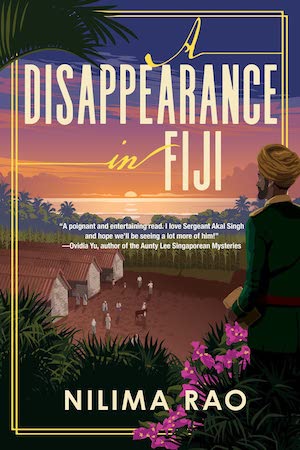A Disappearance in Fiji by Nilima Rao
Nilima Rao leaves the reader wanting more! Her gripping, dramatic debut crime novel A Disappearance in Fiji (Soho Crime) will soon be available in a paperback edition and she is working on an eagerly anticipated sequel A Shipwreck in Fiji. The first book is set in 1914 forty years after Fiji became a British Crown Colony.
Protagonist Police Sergeant Akal Singh is an observant Sikh from a prominent, well-respected family in India drawn to investigative police work who strives to make his father and family proud of his chosen career. He is a cultured, complex and highly intelligent, well-educated man exuding tremendous charm with a solid reputation for solving difficult criminal cases for the Hong Kong Police Department.
Akal was dedicated, ambitious and on track for rapid promotions until a lapse of judgment humiliated him and de-railed his career. Fortunately well-liked by the department head, he was given a chance at redemption, albeit in exile, in the backwater Crown Colony of Fiji where some Sikh police officers were sent to train and augment their police force. His goal is to make amends, solve a sufficient number of cases to restore his reputation enabling a transfer back to Hong Kong.
History of Exploitation, Abuses and Murder
Unfortunately, the Inspector General at the Totogo Police Station in the capital city of Suva has an apparent dislike of the extremely tall and turbaned Police Sergeant Akal Singh. After six months, he has yet to have been assigned primary responsibility for a case. His colleague, Corporal Taviti, is the one bright spot in the station offering humor and encouragement.
At last, Akal is assigned what should be an open and shut case: the disappearance of an indentured Indian woman from a sugarcane plantation. He is told by the Inspector General to swiftly close the case with minimal investigation. Instead, he opens a veritable can of worms thereby exposing a history of exploitation, abuses and murder.
While Akal and the local doctor work together in this remote area, the overtly hostile plantation owner and his wife refer to him as well as the laborers as “coolies”, threaten to complain about him to “his superiors” and provide only limited provisions and no hospitality.
The sugarcane plantation laborers and their families are clearly afraid to speak frankly to Akal and reveal what they know about the missing woman and the inhumane conditions they endure.
This case is politically charged and failure would cost him his career. A Difference in Fiji is absolutely riveting making it difficult to put down.
Nilima Rao delightfully begins each chapter with entertaining quotes about daily life in 1914 taken directly from the newspaper Fiji Times after discovering the National Archives in Suva had maintained them on microfilm going back to the early 1900s.
A Historical Look at Fiji
Fiji, an archipelago of about 330 islands of which only 110 are inhabited, is located in the South Pacific Ocean. The country was first settled over 3500 years ago by Melanesian islanders who lived in small, fortified settlements scattered along the coastlines.
They were highly skilled in navigation and boat building (but curiously not long-distance sailing) as well as being excellent fishermen and expert, innovative farmers who developed and used irrigation systems, and were known as fine artisans for their bark cloth and pottery.
Disagreements between neighboring communities escalating to warfare were common. Fiji was sighted and visited by several notable European seafarers in the 17th century including Abel Tasman from Holland in 1643, Captain James Cook in 1774 and twice by Captain William Bligh before and after the 1789 mutiny on the HMS Bounty.
Commercial and missionary interest increased greatly in the 19th century as did internal conflicts. Europeans rapidly depleted the profusely growing sandalwood followed less successfully by cotton cultivation at the time of the American Civil War.
Fiji became a British Crown Colony in 1874 with first governor Sir Hercules Robinson, soon replaced by Sir Arthur Gordon who considered himself to be the Protector of the Fijian people yet limited their direct involvement in policies relating to commerce and politics.
The most successful export crop became sugar cane leading to the establishment of large plantations. Initially, many native Fijians along with captured islanders from more distant shores and even some prisoners of war were illegally sold into slavery to work the plantations. Sir Gordon actively encouraged the expansion of sugar cane farming under the guise of economic development through the introduction of indentured Indian workers further aided by outside investment from Australia’s Colonial Sugar Refining Company.
Colonization vastly enriched white settlers, investors and absentee owners as sugar plantations proliferated along with processing plants and refineries. Meanwhile, subjugation, racism and exploitation of the native Fijians and Indian workers became institutionalized.
Exploitation and Subjugation of Laborers
Uneducated Indians of low or untouchable classes were exploited in barely legal schemes to secure cheap contract labor. Most had never heard of Fiji and when they asked where it was located, recruiters blatantly lied, implying it was in India, “just past Calcutta” and not revealing it was another country nearly 7400 miles distant across treacherous waters.
In mid-May, 1879, the first shipment of nearly 500 laborers arrived. By the time this abusive scheme ended in 1916, some 61,000 Indian workers were brought to Fiji. They had five-year contracts with long hours and difficult tasks.
If daily tasks were not completed, another day would be added. If someone were ill or missed a day for a death in the family, any unfulfilled days were also added. Thus, a five-year contract might stretch to as much as eight years with low pay, harsh conditions and inferior food. Some owners and overseers were cruel masters who might take sexual advantage of the women and girls.
Optimally, when a five-year indenture ended, the workers could return home to India at their own expense. If they renewed for another term of five years, they could receive paid passage or remain in Fiji. Little land was available for sale for permanent settlement.
Former migrant workers had fewer rights than native Fijians yet despite much racial tension, many grievances and continual discontent, more than half chose to remain in Fiji or later immigrated to Australia. As dire as the system now seems, it offered more opportunities for advancement and positive change than life in India would have done. Colonialism ended on October 10, 1970, when the country became independent of Great Britain.
Imagined From Great-Grandparents’ Experiences
Author Nilima Rao, who resides in Melbourne, describes herself as a Fijian Indian Australian stating she drew inspiration for A Disappearance in Fiji by imagining the experiences of her great-grandparents who were deceased long before she was born. Prior to World War I, they had courageously left India for Fiji to work as indentured servants unsure if they would ever see their home country or beloved relatives again.
Her immediate family knew very little about the hardships they endured in these humble beginnings as they left no written memories nor would they even speak of this time. Her own parents left Fiji for India during a time of increased military coups and uprisings.
When Nilima was three, they immigrated to North Queensland, Australia. Research for this amazing book presented unique challenges as most of the migrant workers were illiterate and consequently left no personal written accounts. In 2016, she spent two months in Fiji combing through newspaper reports written by Australians or British citizens, often missionaries who thoroughly condemned the program. Government and company records did contain documentary evidence about the living conditions and terms of contracts.
Nilima Rao has admirably managed to create realistic historical fiction about a little-known chapter in Indian, Fijian, British and Australian history. Police Sergeant Akal Singh will make a great subject for an ongoing series whether he chooses to remain in Fiji or receives an opportunity to return to Hong Kong or India.
A Disappearance in Fiji would be an excellent selection for book clubs. Nilima Rao has much to offer her readers. Her appealing work compares favorably to established writers like Sujata Massey and Naomi Hirahara as well as some of the lesser-known fine authors such as Chitra Banerjee Divakaruni, Balli Kaur Jaswal, and Melody Razak who write movingly about cultural identity and heritage.



 Nilima Rao is a Fijian Indian Australian who has always referred to herself as “culturally confused”. She has since learned that we are all confused in some way and now feels better about the whole thing. When she isn’t writing, Nilima can be found wrangling data (the dreaded day job) or wandering around Melbourne laneways in search of the next new wine bar.
Nilima Rao is a Fijian Indian Australian who has always referred to herself as “culturally confused”. She has since learned that we are all confused in some way and now feels better about the whole thing. When she isn’t writing, Nilima can be found wrangling data (the dreaded day job) or wandering around Melbourne laneways in search of the next new wine bar.

